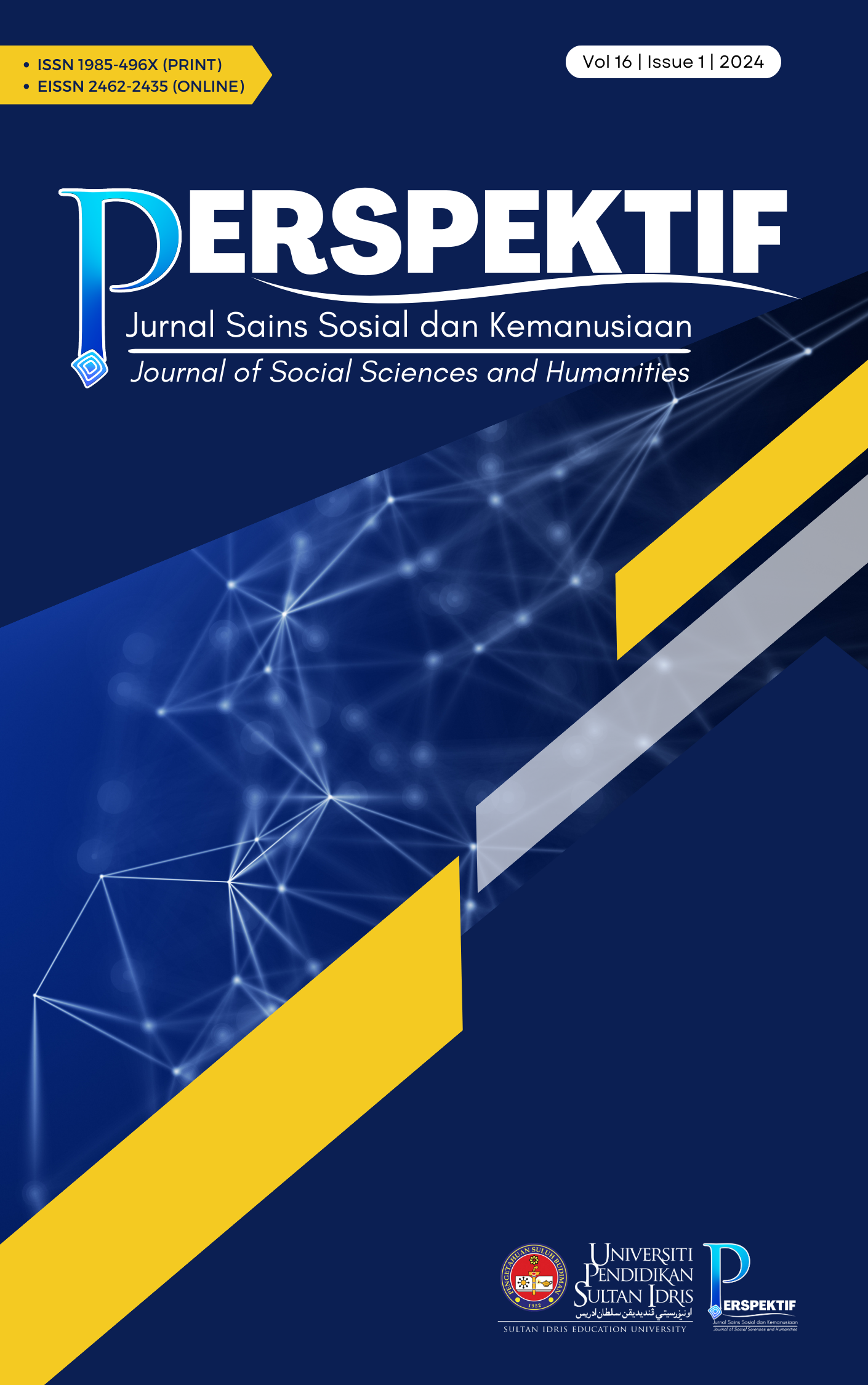Gen Z and Language Dynamics: Lexical Choice of English among Malay Students at Universiti Teknikal Malaysia Melaka (UTeM) Based on Pragmatic Analysis
DOI:
https://doi.org/10.37134/perspektif.vol16.2.9.2024Keywords:
Lexical Choice, English Language, Gen Z, Relevance Theory (RT)Abstract
This study examines the lexical choice of English by Malay Gen Z speakers at Universiti Teknikal Malaysia Melaka (UTeM) in the domain of clothing, using pragmatic analysis based on Sperber and Wilson's (1985) Relevance Theory (RT). The study aims to understand why and how Malay Gen Z students choose between British English and American English, with the main issue being the generation's tendency towards American English that is influenced by Western entertainment culture. The study employs a qualitative approach with text analysis, using a lexical corpus from Algeo's (2006) "British or American English?: A Handbook of Word and Grammar Patterns." The data involves the selection of five types of clothing: jumper or sweater, trousers or pants, trainers or sneakers, waistcoat or vest, and nappy or diaper, involving 100 Malay Gen Z informants (50 males and 50 females) selected using purposive sampling. Findings indicate that Malay Gen Z speakers tend to prefer American English lexical items over British English in the context of clothing. For example, "sweater" was chosen by 74 informants compared to "jumper" chosen by 22 informants, while "pants" was chosen by 91 informants compared to "trousers" chosen by 3 informants. According to RT, this choice reflects lower cognitive effort and higher contextual relevance, with American media playing a significant role in shaping lexical preferences. In conclusion, understanding the dynamics of language and pragmatics among Malay Gen Z students is crucial for developing more relevant and effective English teaching strategies at the higher education level.
Downloads
References
Abdullah Hassan. (2009). Malay language and the influence of English. Penerbit Universiti Pendidikan Sultan Idris.
Algeo, J. (2006). British or American English?: A handbook of word and grammar patterns. Cambridge University Press.
Asmah Haji Omar. (1992). The linguistic scenery in Malaysia. Dewan Bahasa dan Pustaka.
Ayichew, T. (2020). The effects of television advertisement on consumers’ brand image of baby diapers (Doctoral dissertation, St. Mary’s University).
Bednarek, M. (2012). Constructing ‘nerdiness’: Characterisation in The Big Bang Theory. Multilingua, 31(2-3), 199-229.
David, M. K., McLellan, J., & Rafik-Galea, S. (2008). Code-switching in Malaysia: Forms, functions and frequencies of borrowings in Chinese and Tamil. Lambert Academic Publishing.
DeMello, M. (2009). Feet and footwear: A cultural encyclopedia. Bloomsbury Publishing USA.
Gill, S. K. (2012). Language policy challenges in multi-ethnic Malaysia. Springer.
Gilquin, G. (2018). American and/or British influence on L2 Englishes – Does context tip the scale(s). In Modeling world Englishes: Assessing the interplay of emancipation and globalization of ESL varieties (pp. 187-216).
Grieve, J., Nini, A., & Guo, D. (2017). Analyzing lexical emergence in modern American English online. English Language and Linguistics, 21(1), 99-127.
Gulnazir, N., & Salehuddin, K. (2022). Investigating lexical variation and change in Malaysian Twitter: A conceptual paper. GEMA Online Journal of Language Studies, 22(4), 90-107.
Haenlein, M., Anadol, E., Farnsworth, T., Hugo, H., Hunichen, J., & Welte, D. (2020). Navigating he new era of influencer marketing: How to be successful on Instagram, TikTok, & Co. California Management Review, 63(1), 5-25.
Koo, H. S., Dunne, L., & Bye, E. (2014). Design functions in transformable garments for sustainability. International Journal of Fashion Design, Technology and Education, 7(1), 10-20.
Kunalan, R., Mutty, B., & Francis, K. (2021). Lexical borrowing in Malaysian online newspaper editorials: A corpus-based approach. International Journal of Education, Psychology and Counseling, 6(40), 93-98.
Mohd Nizam Yusof, & Muhammad Zaid Daud. (2023). Keterikatan pola ayat dasar Bahasa Melayu dalam Pengajaran dan Pembelajaran (PdP) Bahasa Jepun: Analisis Pragmatik. Buletin Penyelidikan Cendekia, 1(1), 23.
Muhammad Zaid Daud. (2024). Cerminan sikap dan watak mitos Melayu (seloka jenaka) dalam kancah politik Malaysia: Analisis pragmatik [Unpublished doctoral dissertation]. Universiti Malaysia Sarawak.
Ng, S. I., Ho, J. A., Lim, X. J., Chong, K. L., & Latiff, K. (2021). Mirror, mirror on the wall, are we ready for Gen-Z in marketplace? A study of smart retailing technology in Malaysia. Young Consumers, 22(1), 68-89.
Noorsaiyidah Suradi, & Muhammad Zaid Daud. (2023). “British English or American English?”: Penutur Melayu Gen Z dan pemilihan leksikal dalam domain pakaian berpandukan analisis pragmatik. Buletin Penyelidikan Cendekia, 1(1), 39.
Nur Farain Ali, & Muhammad Zaid Daud. (2023). Unsur implisit dalam lagu rakyat “Mein Vater War Ein Wandersmann” bagi masyarakat Jerman berpandukan akal budi Melayu dan pragmatik. Buletin Penyelidikan Cendekia, 1(1), 34.
Sezgin, H. (2019). Spoken language in TV series: A comparative corpus analysis (Master's thesis, Necmettin Erbakan University).
Sperber, D., & Wilson, D. (1985). Relevance: Communication and cognition. Harvard University Press.
Srikandi@Saemah Samaon, Mary Fatimah Subet, & Muhammad Zaid Daud. (2023, October). Meneladani sikap positif dan nilai kemanusiaan dalam Pengajaran dan Pembelajaran (PdP) seni bahasa: Analisis pragmatik [Paper presentation]. Persidangan Antarabangsa Bahasa, Sastera dan Budaya Melayu (RENTAS 2023), Hotel EDC, Universiti Utara Malaysia.
Wan Noor Farah Wan Shamsuddin, Ain Nadzimah Abdullah., Tan, H., & Jusang Bolong. (2019). Attitudes and driving factors behind the attitudes of Malaysian university students towards British English and American English. International Journal of Humanities, Philosophy, Language, 2(5), 01-12.
Downloads
Published
How to Cite
Issue
Section
License
Copyright (c) 2024 Noorsaiyidah Suradi, Muhammad Zaid Daud

This work is licensed under a Creative Commons Attribution-NonCommercial-ShareAlike 4.0 International License.





